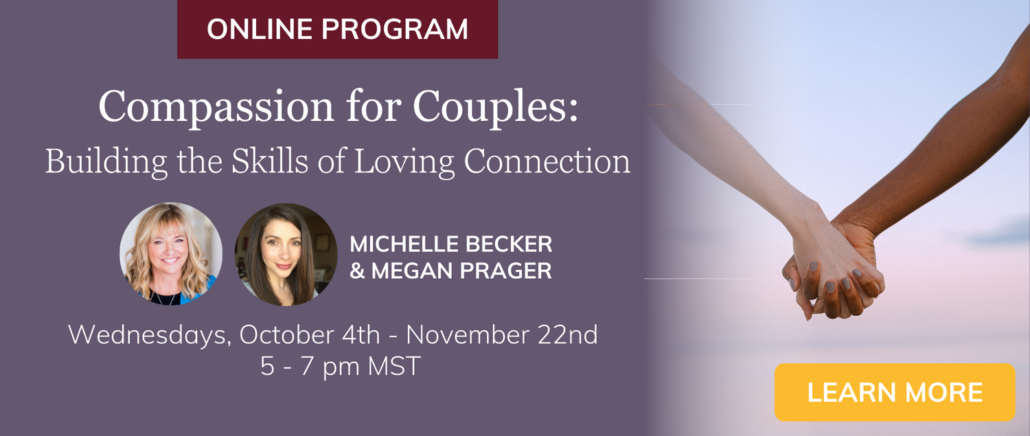Tending to Our Wounded Hearts
By Michelle Becker
“If someone comes along and shoots an arrow into your heart, it’s fruitless to stand there and yell at the person. It would be much better to turn your attention to the fact that there’s an arrow in your heart…” ― Pema Chodron, “Start Where You Are: A Guide to Compassionate Living”
Who among us hasn’t experienced a metaphorical arrow to the heart? If it were a real arrow we’d likely tend to the wound. Yet, moments when we are pained by words and deeds are inevitable experiences in human relationships. Admit it – it is a common defensive reaction to blame the other person, to get upset with them, to tell them how wrong they were to cause us injury. And, it is so tempting to shoot another arrow right back into their heart.
How does this usually work out for us? As a couples therapist, I’ve witnessed the harm that slinging arrows causes. It tends to make relationships more painful, less safe, and feeds a downward relational spiral. While it is a common human impulse, it isn’t a particularly skillful action to take. Hurting others doesn’t help our wounds to heal, it just increases the likelihood of perpetuating a cycle of injury. And in actuality, when we focus on blaming the other, we abandon our own selves and our own wounded heart does not get the care and tending it needs.
While it may seem counterintuitive, inclining towards our own woundedness with kindness is a much more skillful response. If we can remember to pause, acknowledge the hurt, and tend to our own healing, we can shift our perspective from reactiveness to engaging in relationships from a position of wholeheartedness. I call this stance “wise compassion” and when we cultivate it for ourselves and others, our relationships benefit.
Wise compassion helps us remember and enact our own core values. It’s unlikely that any of us would choose to be reactively hurtful. When we pause we have the opportunity to benefit from the integrity of knowing we are choosing to behave in a way that is in alignment with our values. Compassion is iterative, when we begin with ourselves, we are more likely to behave compassionately. When we are hurt, we ourselves need compassion, so we begin with our own injury.
We know how to do this! Many of us are very good at tending to others when they are injured. We naturally respond to them with kindness and care. We intuitively give them what we long to receive ourselves. But offering ourselves compassion isn’t quite so easy for many of us. Most of us look for compassion from outside ourselves, if we look for it at all. We long to hear someone else acknowledge our pain, reassure and comfort us. The good news is that we already have the ability to be compassionate, we just need to shift the focus a bit, from others to ourselves. One way to work with this is to “warm up” our compassion, by considering how we would treat a friend who was going through the same thing, then turning our attention toward ourselves.
Practice: How Would I Treat a Friend?
When someone shoots an arrow into your heart, practice pausing. Moving from reactivity to responsiveness requires a pause to feel the sensations. Let the reactive impulses pass. See if you can locate yourself in this moment. Where does it hurt? Beneath the hard shell of anger there is an injury. What is it? Are you feeling scared, embarrassed, unloved, unworthy, ashamed, lonely, rejected, etc.? See if you can name the most prominent emotion present.
Now call to mind a dear friend or loved one who also had a similar experience. Take a moment to call the situation to mind, or imagine that they were in the very same situation you are in. Notice what you naturally do to comfort, soothe and reassure them. Perhaps there is a kind touch involved? Perhaps a warm and accepting gaze? Maybe there are some reassuring words you would like to say to them? In your mind, offer your friend whatever gestures or words feel right to you right now.
Now imagine yourself sitting beside them, or just having a felt sense of the two of you together. Notice that neither of you are alone in feeling this way. You both know what it feels like to have an arrow in your heart. Begin offering your compassionate gesture to both of you, including yourself in the circle of compassion. In your mind’s eye, gazing at both of you with a warm and accepting gaze. Offering any kind touch that seems appropriate, and saying whatever reassuring and soothing words feel right to you. Stay with this for as long as you need.
When you are ready, let go of the image of the loved one and courageously focus on yourself now. Offer yourself the same kind gaze and compassionate words. Perhaps placing a hand on your heart, or whatever place feels comforting. Focus first on offering yourself your own compassionate gestures. After a while, when you are ready, you might shift the focus to letting yourself receive the compassionate gestures to whatever extent you are able to let compassion in. Allow yourself to linger with this exercise as long as you like. When you feel ready to be done, pause to offer yourself gratitude for the willingness to tend to yourself and for the kind and compassionate intention behind the practice.
Taking the time to tend to ourselves with compassion gives us a balanced perspective to interrupt arrow slinging and downward relational spirals. Meeting our own needs, we can become curious about what may be happening for the other person and what they might need. Considering and acting from our needs and values along with our desires for the relationship, we can choose responses that are much more skillful – whether that involves setting a limit or comforting and soothing each other. Self-compassion is the first step in the Compassion for Couples program. Join us and build the skills of loving connection.
About Michelle Becker



